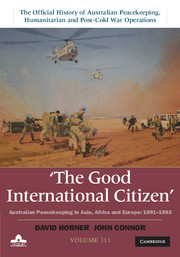Book contents
- Frontmatter
- Contents
- Maps
- Preface
- Chronology 1989–99
- Abbreviations
- Part 1 Strategy and policy
- Part 2 Cambodia
- Part 3 Western Sahara
- Part 4 Former Yugoslavia
- 14 Roads not taken
- 15 A modest commitment
- Part 5 Watch on Iraq
- Appendix A United Nations Security Council resolutions
- Appendix B Major office bearers, 1991–99
- Bibliography
- Index
- Plate section
- References
15 - A modest commitment
Australian peacekeepers in the former Yugoslavia, 1997–2004
from Part 4 - Former Yugoslavia
Published online by Cambridge University Press: 12 May 2022
- Frontmatter
- Contents
- Maps
- Preface
- Chronology 1989–99
- Abbreviations
- Part 1 Strategy and policy
- Part 2 Cambodia
- Part 3 Western Sahara
- Part 4 Former Yugoslavia
- 14 Roads not taken
- 15 A modest commitment
- Part 5 Watch on Iraq
- Appendix A United Nations Security Council resolutions
- Appendix B Major office bearers, 1991–99
- Bibliography
- Index
- Plate section
- References
Summary
The impending transition from the Implementation Force (Ifor) to the Nato-led Stabilisation Force (Sfor) in Bosnia–Herzegovina in December 1996 gave the British Army yet another opportunity to seek assistance from Australia. By November, Britain had begun reducing the number of its personnel in Ifor in preparation for the establishment of Sfor, which was expected to consist of about 31 000 personnel from Nato and non-Nato countries. The United States would be contributing 8500 personnel and Britain about 5000. It was thought that Nato would maintain a presence in Bosnia until June 1998. Britain expected to command a force known as Sector South West, consisting of two British battalions and a battalion each from Canada, the Czech Republic, Malaysia and the Netherlands.
In the first week of November 1996 the British Chief of the Defence Staff, Field Marshal Sir Peter Inge, asked his staff to seek informal advice as to whether Australia would consider participating in Sfor. The British had in mind several options, ranging from the provision of six staff officers for the Sector South West headquarters through to a force of engineers, a logistics company or a mechanised infantry company. Senior officials in the Australian Defence Department in Canberra knew that the government's policy did ‘not allow direct involvement in operations in the former Yugoslavia’ and considered that a larger contribution would also be ‘unacceptable on the grounds of expense and the potential risk faced by such contingents’, but they thought the provision of staff officers would provide training opportunities ‘not otherwise available in Australia in peacetime’. The staff officers would also give Australia wider access to Nato, including intelligence and planning, and also, through Nato, access to the United States Europe Command. Experience in the Middle East had shown that if Australia had access to the headquarters of US military commands it could gain forewarning of possible military operations, and hence would be in a better position to decide whether to become involved and, if so, what forces it might deploy. The Chief of the Defence Force, General John Baker, agreed, noting that the ‘trick will be to obtain staff positions which offer good experience and development opportunities rather than left overs’. As a result the Defence Minister, Ian McLachlan, gave approval for the head of the Australian Defence Staff in London, Brigadier Peter McGuiness, to seek further information about the proposal.
- Type
- Chapter
- Information
- The Good International CitizenAustralian Peacekeeping in Asia, Africa and Europe 1991–1993, pp. 371 - 392Publisher: Cambridge University PressPrint publication year: 2014

